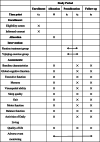Effectiveness of Yijinjing on cognitive functions in post-stroke patients with mild cognitive impairment: study protocol for a randomized controlled trial
- PMID: 33836807
- PMCID: PMC8034135
- DOI: 10.1186/s13063-021-05220-w
Effectiveness of Yijinjing on cognitive functions in post-stroke patients with mild cognitive impairment: study protocol for a randomized controlled trial
Abstract
Background: Statistics show that every year, 5.4 million people in the world suffer a stroke. Post-stroke cognitive impairment (PSCI) is one of the most common complications after stroke with a rate of 75%, which leads to decreased functions for independent living and reduced quality of life (QOL). Exercise training has been reported to be useful to improve the cognitive functions of post-stroke patients. Yijinjing, a traditional Chinese Qigong exercise characterized by an integration of mind and body in moderate exercise intensity, can improve cognitive functions of PSCI patients. This study aims to explore the feasibility and effectiveness of the Yijinjing exercise in this regard.
Methods: A single-blind, superiority, randomized controlled trial will be employed with evaluations at 3 and 6 months. Seventy-two PSCI patients will be recruited and randomly assigned to the Yijinjing exercise intervention group or the control group (1:1). Participants in the control group will receive routine rehabilitation therapies, including occupational therapy, physical therapy, acupuncture therapy, and health education 5 times a week for 3 months. The intervention group will receive a 12-week routine rehabilitation therapy combined with the Yijinjing exercise intervention for 40 min each session and 3 sessions a week. The primary outcome of cognition will be measured by the Montreal Cognitive Assessment scale (MoCA). Secondary outcomes include executive function, memory function, visuospatial function, sleep quality, gait and motor function, activity of daily living (ADL), and quality of life (QOL).
Discussion: Current evidence has reported the effectiveness of traditional Chinese exercise in improving the post-stroke population's motor functions. This research is a randomized controlled trial that evaluates traditional Chinese exercise's effectiveness for PSCI patients. It is expected to expand the traditional Chinese exercise scope and provide a new treatment approach for stroke populations with cognitive impairments.
Trial registration: Chinese Clinical Trial Registry ChiCTR1900026532 . Registered on 13 October 2019.
Keywords: ADL; Post-stroke cognitive impairment; QOL; Randomized controlled trial; Yijinjing.
Conflict of interest statement
All authors declare that they have no competing interests.
Figures



Similar articles
-
Utilizing fNIRS to investigate the impact of Baduanjin training on attentional function in post-stroke cognitive impairment patients: a study protocol for a randomized controlled trial.BMC Complement Med Ther. 2024 Jan 11;24(1):30. doi: 10.1186/s12906-023-04284-2. BMC Complement Med Ther. 2024. PMID: 38212808 Free PMC article.
-
Effects of different acupuncture treatment methods on post-stroke cognitive impairment: study protocol for a multicenter randomized controlled trial.Trials. 2021 Jan 6;22(1):27. doi: 10.1186/s13063-020-04959-y. Trials. 2021. PMID: 33407773 Free PMC article.
-
Effectiveness of Yijinjing on cognitive and motor functions in patients with Parkinson's disease: study protocol for a randomized controlled trial.Front Neurol. 2024 Apr 26;15:1357777. doi: 10.3389/fneur.2024.1357777. eCollection 2024. Front Neurol. 2024. PMID: 38737352 Free PMC article.
-
Effects of moxibustion on cognition and activities of daily living in post-stroke cognitive impairment: A systematic review and meta-analysis of randomized controlled trials.J Nurs Scholarsh. 2023 Mar;55(2):464-476. doi: 10.1111/jnu.12846. Epub 2022 Nov 8. J Nurs Scholarsh. 2023. PMID: 36345735
-
Effect of Acupuncture on Cognitive Function in Patients With Post-Stroke Cognitive Impairment: A Systematic Review and Meta-Analysis.Brain Behav. 2024 Oct;14(10):e70075. doi: 10.1002/brb3.70075. Brain Behav. 2024. PMID: 39402813 Free PMC article.
Cited by
-
Effect of Traditional Chinese Exercises on Patients with Chronic Heart Failure (TCE-HF): A Systematic Review and Meta-Analysis.J Clin Med. 2023 Mar 9;12(6):2150. doi: 10.3390/jcm12062150. J Clin Med. 2023. PMID: 36983152 Free PMC article. Review.
-
Effects of traditional Chinese mind-body exercises on older adults with cognitive impairment: A systematic review and meta-analysis.Front Neurol. 2023 Apr 3;14:1086417. doi: 10.3389/fneur.2023.1086417. eCollection 2023. Front Neurol. 2023. PMID: 37077563 Free PMC article.
-
Effects of robot-assisted therapy on upper limb and cognitive function in patients with stroke: study protocol of a randomized controlled study.Trials. 2022 Jun 28;23(1):538. doi: 10.1186/s13063-022-06361-2. Trials. 2022. PMID: 35765084 Free PMC article.
-
Yijinjing Qigong intervention shows strong evidence on clinical effectiveness and electroencephalography signal features for early poststroke depression: A randomized, controlled trial.Front Aging Neurosci. 2022 Aug 10;14:956316. doi: 10.3389/fnagi.2022.956316. eCollection 2022. Front Aging Neurosci. 2022. PMID: 36034130 Free PMC article.
-
Exercise training-attenuated insulin resistance and liver injury in elderly pre-diabetic patients correlates with NLRP3 inflammasome.Front Immunol. 2023 Feb 1;14:1082050. doi: 10.3389/fimmu.2023.1082050. eCollection 2023. Front Immunol. 2023. PMID: 36817440 Free PMC article. Clinical Trial.
References
-
- Yang S, Ye H, Huang J, Tao J, Jiang C, Lin Z, Zheng G, Chen L. The synergistic effect of acupuncture and computer-based cognitive training on post-stroke cognitive dysfunction: a study protocol for a randomized controlled trial of 2×2 factorial design. BMC Complement Altern Med. 2014;14(1):290. doi: 10.1186/1472-6882-14-290. - DOI - PMC - PubMed
Publication types
MeSH terms
Grants and funding
LinkOut - more resources
Full Text Sources
Other Literature Sources
Medical

